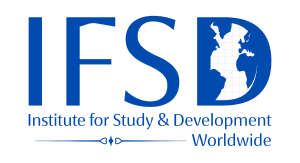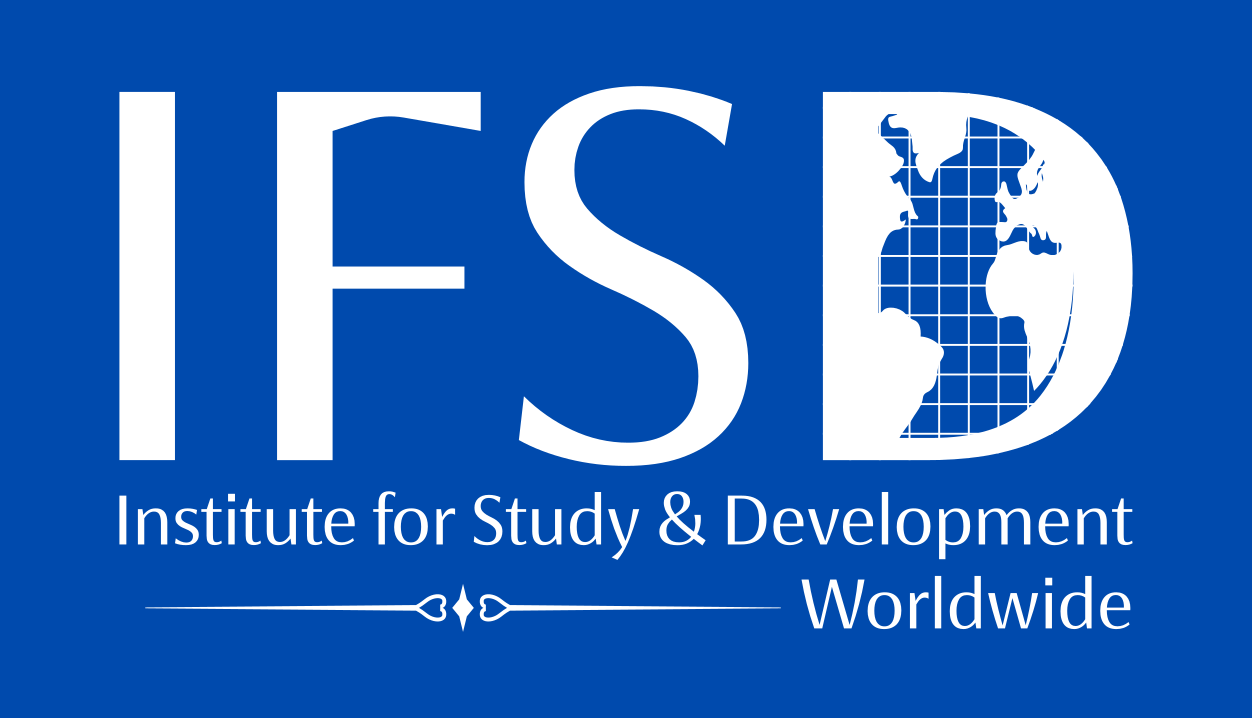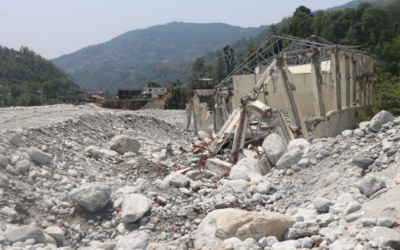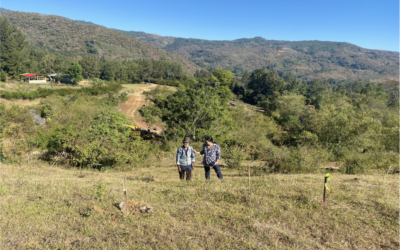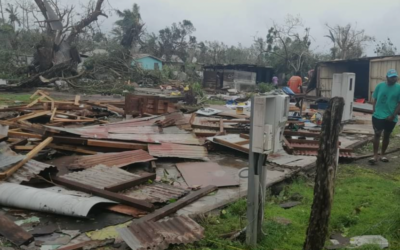Adapting Governance for Inclusive Climate Resilience

Overview
The Govt-Adapt Dialogue II on “Adapting Governance for Inclusive Climate Resilience” focused on how we can achieve the re-politicisation of adaptation, through creating space for dialogue, recognition of broader knowledges and transformational community resistance. The Dialogue was held virtually on Tuesday 24 May, 2022 with 40 people attending from Asia, Australia, Europe, and Africa.
The Dialogue was the second in a series organized by Institute for Study and Development Worldwide (IFSD) in partnership with Swedish University of Agricultural Sciences and University of Oslo. It was co-hosted by Dr Hemant Ojha and Prof Andrea Nightingale, along with Prof Jeff Camkin as the moderator.
Many responses to climate change continue to be technical in nature, overlooking political and governance dimensions. Our collective research and experience show that power imbalances are preventing adaptation practices from being inclusive, particularly as the voices of the most vulnerable groups are largely ignored in adaptation planning and decision making.
Objective
This dialogue aimed to find ways to better support adaptation policy and practices in order to foster better adaptation planning, governance, action, and outcomes in vulnerable communities and countries.
Opening Remarks
Jeff Camkin (Moderator)
Jeff began the meeting by recounting the key organising premise from the first Govt-Adapt Dialogue held on 14 April; namely, that adaptation is often seen as a technical fix, but rather is a political process. There is clearly a need for re-politicization of adaptation. The second dialogue thus takes up the challenge of how we can achieve that re-politicization through creating space for recognition of broader knowledges and transformational community resistance. This was followed by a brief introduction to the co-hosts and speakers along with a general overview of the event timeline.
Andrea Nightingale (Co-host)
Andrea also picked up on the outcomes of the first dialogue, particularly those regarding governance and adaptation, many of which are echoed in the international literature. Adaptation is not simply a matter of building the right infrastructure or finding out who is most vulnerable. It rather implies a realignment of people in relation to their resources and to institutions for governing them. If understood as inherently a political process, then the pressing questions are: Who is authorized to govern change? Who is assumed to need to adapt? Who is seen to have the knowledge, skills, and tools for adaptation? Rarely are those assumed to be the same people. The dialogue emphasized understanding the implications of thinking differently and what it might be entailed as we try to govern a future that is uncertain.
Hemant Ojha (Co-host)
Hemant mentioned how the first dialogue highlighted how and where the governance dimension within adaptation is missed through the experiences of the four speakers. Adaption planning, decision-making, and practices at all levels solely focus on the bio-physical dimension which is exclusionary, preventing knowledge of indigenous, local communities, and women to be considered. He then mentioned Bangladesh and Vietnam as examples stating how despite some successes, the overall early efforts of adaptation have failed due lack of inclusivity. He further emphasized that the dialogue should focus on finding ways to bring diverse knowledge together for adaptation planning and decision-making.
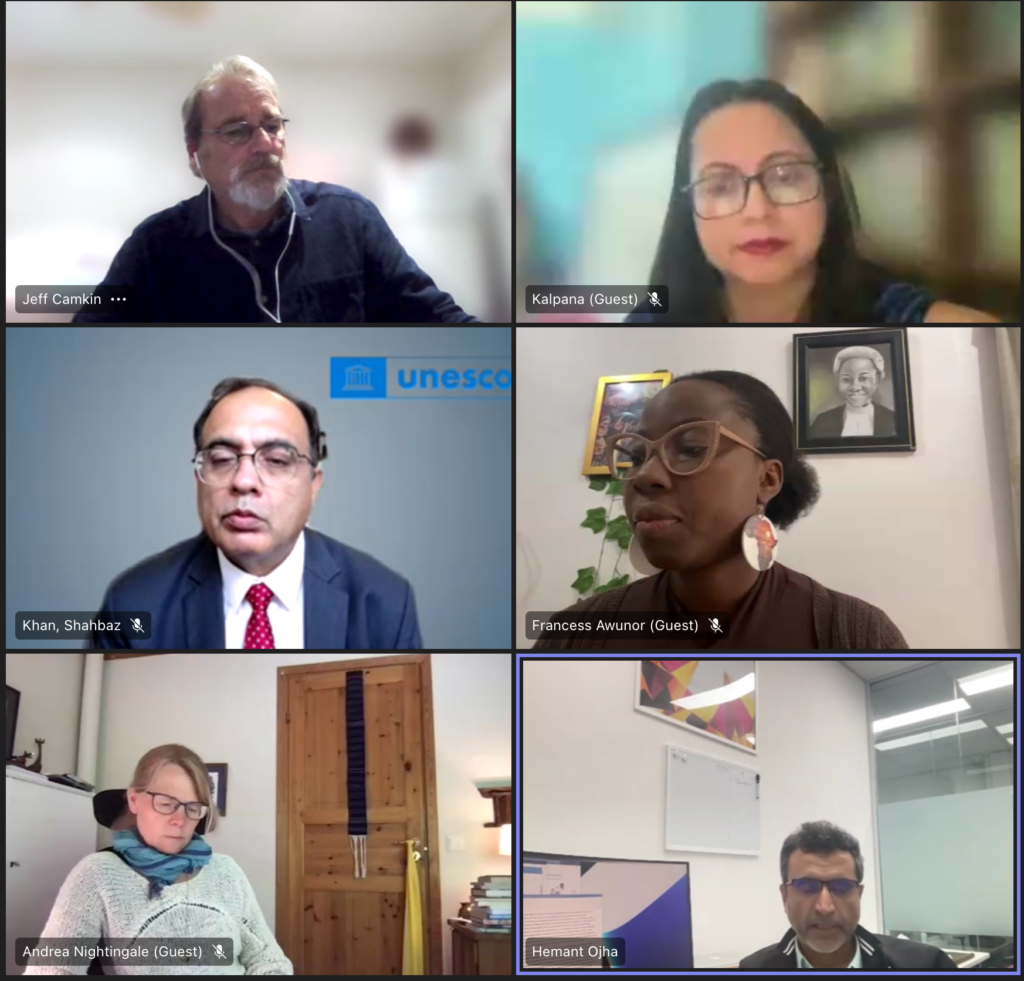
Speakers and Key Messages
Shahbaz Khan
The moderator asked the following questions to Shahbaz Khan: “Shahbaz, you have been involved in the discussions on climate change and sustainable development around the world for many years. What is the role of science in improving the capacity of developing countries to better negotiate and implement climate adaptation? How can UNESCO, including the new UNESCO Recommendation on Open Science, help improve adaptation governance for more inclusive outcomes? And finally, does UNESCO have a role in improving accountability for better climate adaptation – what is your view?”
Shahbaz Khan gave a presentation on UNESCO’s many ongoing strategic efforts to scale up climate actions through education, science, culture, information, and communication addressing on climate change as a multi-scale challenge.
Key messages:
- Human rights are intimately linked to climate change with many international environmental laws focusing on finding ways to achieving climate justice. So, equal focus should be on the human rights angle as is given to climate change science.
- Every government is committed to achieving the SDGs with the support from the United Nations. UNESCO is providing support through education, information, communication, and culture. However, there is a problem of integration as every commitment has its own governance mechanism. So, there certainly is a challenge and a need to work on bringing the UNFCCC, SDGs, and national commitments under one governance mechanism.
- It is challenging to find the relevant knowledge for adapting to climate change as local indigenous knowledge continues to be ignored. There is a need to co-produce knowledge by organizing intergenerational dialogues between different local indigenous communities, scientists, and researchers.
- There is a challenge to include local people and their governance framework in dialogues. For this, we need a governance system that properly acknowledges the role of indigenous and local communities and finds ways to bring cooperation between them, regional, national, and international actors.
Follow up question from online participants asked by the moderator: “Do you see intergenerational dialogues happening in a practical way? Do you think that’s common and if it’s not is it the new skills that we need or is it just a new attitude?”
Shahbaz mentioned the challenging situation of engaging youths and the efforts countries are making to address this issue. He highlighted the generational gap in knowledge. Today the younger generation is way more advanced, and their knowledge is evolving very quickly, making it challenging for the older generation to keep pace with them. Certainly, it is a must to have intergenerational dialogues to reach common ground to understand the value of knowledge each generation has. Over the years, UNESCO has seen the participation of youth significantly increase. However, we still need to find ways to bring all generations together.
This was followed by another question asked by Hemant Ojha: “How can we support UN agencies and international donors towards co-production of knowledge in climate adaptation?”
Shahbaz emphasized the importance of synthesizing knowledge by providing researchers and graduate students with the resources to produce papers ready for policy advice. He highlighted that much research simply ends up in papers that nobody reads. So, it is crucial to cultivate knowledge so that it is readily available for solving real world problems.
Kalpana Giri
The moderator asked the following questions to Kalpana Giri: “Kalpana, you have been a great champion for gender and social inclusion in international development, including relating to climate issues. In your view, what are the key barriers to effective gender-based inclusion at a program level, within organisations, and in practice? How can we make knowledge and science more gender responsive in relation to climate and development? And finally, what do you think needs to be done to hold decision makers accountable to deliver on Gender Equity and Social Inclusion practices and outcomes?”
Kalpana Giri began by talking about the barriers faced while working in climate change adaptation, followed by the ways to address it.
Key messages:
- At all levels (organizational, program, and practice), the concept of gender and social inclusion is still ignored as a fundamental objective of climate change adaptation. Due to this reason, the dominant focus continues to be on technology and scale.
- When working in the social and gender dimensions within climate change adaptation programs, it is found that the focus is mainly on attaining the number and diversity. While this is important, it is not sufficient to change power relations. So, the important priorities and needs of women and marginalized groups from climate change adaptation programs are often not considered.
- There is very minimal effort in implementing the concept of gender and social inclusion in any governance system. In climate change adaptation planning and decision making, it is often the men from elite groups deciding on behalf of women and marginalized groups. At the same time, there are very limited organizations working to address the issue of exclusion.
To address the barriers, Kalpana suggests:
- It is important to pluralize knowledge by explicitly including the knowledge and lived experiences of women, indigenous groups, and marginalized local communities. It is important to recognize their roles in addressing climate change beyond their generalized role as victims. We need to create value from what they bring in climate change adaptation efforts by providing safe spaces for them to engage in.
- Those in power should share their power by working with leaders from indigenous groups, local communities and organizations who are also working on climate change topics. Instead of questioning their efforts and knowledge, we need to trust their voices and experiences.
- With regards to bringing pluralistic forms of knowledge, it is equally important to recognize and even use the diverse research methods and tools for plural analysis. This will allow researchers to look at knowledge in various ways, allowing for better analysis and resulting in effective policy outcomes.
- With digitization and the need to diversify current models of knowledge, it is required to create accessible platforms for knowledge generation and sharing.
- Providing targeted investment to gender programs, along with introducing incentives for results, will encourage more efforts for gender and social inclusivity in climate change programs.
Mizan Khan
The moderator asked the following questions to Mizan Khan: “Mizan, you are championing the voice and perspectives of developing and most vulnerable nations to climate change in the international climate policy space as well as democratizing adaptation governance in Bangladesh. How can we bring the stories and voices of the most vulnerable communities into national and international policy debates, how do we hold those in power accountable so they take timely and meaningful action on adaptation, and lastly how do you think we can democratize climate science to better serve the most vulnerable communities?”
Mizan Khan started off by explaining the timeline of climate change adaptation in the United Nations Framework Convention on Climate Change (UNFCCC) along with his experience as a negotiator representing Bangladesh delegation for 20 years.
Key Messages:
- The Least Developed Countries (LDC) group is the most organized compared to other convention groups as we jointly continue each year to voice our opinions on climate issues. Every two years the chair of the LDC group changes with the current chair being Madeleine Diouf Sarr from Senegal. Experienced climate negotiators like himself and Saleemul Huq have also been providing training to young climate negotiators.
- Despite the Glasgow dialogue being initiated, there still is no proper facilitated facility for climate finance. Every COP (United Nations Climate Change Conference) we see that there is no agreement on adopting climate finance.
- Most reports on climate change are very technical with scientific jargon making it difficult for policymakers to understand the information. It is crucial to write reports that are easy to understand by everyone.
- There is a need to have an effective inclusion and sustainable management between scientific and indigenous knowledge. Local indigenous communities have so much wisdom, something we cannot teach in educational institutions. We need to recognize, value, and integrate their wisdom in adaptation planning and decision making for better outcomes.
Francess Awunor
The moderator asked the following questions to Francess Awunor: Francess, as an energetic African youth activist on sustainability and inclusive development, how have you confronted, or how have you seen others confront power related barriers in public, organizational, community domains? How do you think we make climate knowledge more empowering to youth? And based on your experience in Nigeria and elsewhere, how can climate and development decision makers be held accountable to take meaningful and timely action on climate adaptation?
Francess Awunor shared the learnings from her involvement as a youth climate activist.
Key Messages:
- Young people are motivated to bring change in their communities and are the driving forces in climate research and much of their research is being used at the policy level. However, young people are often excluded and prevented from having additional influence in environmental policies.
- There is a generational gap between youth grassroot advocates who are doing much of the work and the older people at the policy level making decisions. To reduce the gap, young African climate actors are making efforts to build public private partnerships for collaborative engagement. For example, in coastal communities of Nigeria, they have a reward system for those sharing climate knowledge to the community. This is encouraging more youths to be involved in climate action while also improving the education sector of their communities. Various private partners and government have supported the rewards.
- There are many gaps in the climate educational system despite their being an increasing interest in engaging youths in the climate sector.
- There is a need to have more cross generational knowledge dissemination towards youths who are working at the grassroots level to scale up climate actions. For this, we need to get youths more involved in using their research to develop various governance tools.
Panel Discussion
Responding to the knowledge shared, the moderator introduced questions from the audience and hosts for responses from the expert panel.
On addressing emotions and political subjectivities in climate change adaptation programs and projects.
Anyul Islam – “How do we address local people’s emotions and political subjectivities in the climate adaptation programs and projects?”
Kalpana emphasized the importance of recognizing the value of knowledge coming from their emotions. Oftentimes, physical loss gets a lot of attention whereas emotions and feelings attached to climate events are simply seen as just an emotional feeling and not given importance. This way of looking at climate change impacts because only focusing on the physical impacts has led to the power divide between researchers, development partners, government and the local and indigenous communities. So, we need to look at the impacts from the emotional angle as well. For this, there are multiple approaches and methods, such as focal group discussions, personal interviews etc. Likewise, understanding the existence of differential impacts within a community will also allow researchers to look at the problem from an intersectional angle which will help them collect more concrete data for effective climate adaptation programs and actions.
Mizan mentioned that local people should be the leaders in designing and implementing adaptation related policies. Along with this, it is important to link local-led adaptation programs and policies with those at the national and international level, because only then will the local efforts be supported by a conducive policy and institutional framework. Capacity building is needed for local government officials and elected community representatives because, after all, climate change has to be addressed through economic processes.
Francess supported Mizan’s answer by emphasizing the need for youth and climate actors at the community level to be included in proper stakeholder engagement. Ensuring this inclusive and comprehensive approach will be relevant for both the present and future generations.
On creating a balance within gender and social inclusion
Wendy Conway Lamb – “Can you say more about getting the balance right between better including women, indigenous people and young people in climate decision-making action without placing undue burden on them? For example, who else should be responsible and how?”
Francess mentioned that responsibility lies with both the public sector and individuals involved to achieve proper balance. While everyone (youth, women, indigenous communities) wants to be included, it should come from a place of capacity and the contributions made by them so that there is no debate amongst one another for inclusion. There is enough space for inclusion and the focus should be on the value the group brings to that particular matter.
Kalpana highlighted the importance of understanding that the world is unequal and there are certain groups that face historical and existing inequalities. So, failing to take that into account this realization will create a void in this whole discourse on equity. Instead of focusing on ways to balance out, we need to focus on creating enabling structures and governance mechanisms that acknowledge both systemic privileges and discrimination to further create a path that helps address the problem of inequality.
Mizan supported Kalpana’s answer by stating that balance doesn’t mean that numerically you have to have 50:50. The older generation for the past 25 years haven’t done much to address climate change and thus progress is also very slow. So, there is a focus on youth leadership as their voices can be made stronger because they can play a critical role in influencing their parents’ generation to listen. Moving onto the topic of gender, he talked about an op-ed he wrote arguing that women are better husbands than the so-called husbands. In this piece, he highlights how women have also always been more responsible in maintain their households compared to their husbands who mostly spent money on personal welfare. In the case of climate change, women continue to be the front-line victims as they are resource collectors for their family. There is a need to bring in equal number of youth and women leaders, train them and provide mentorship to help them be a spokesperson for their communities.
Closing Remarks
Hemant summarized the discussion so far by explaining how climate change adaptation a battlefield, with three important factors involved – power, knowledge, and resource.
Many institutions and governance mechanisms are involved in this fight for the global authority to influence climate change related decisions. There are a lot of ongoing conflict negotiations between the developing and developed world, and within countries between local and regional and national level actors. So, at every level there is a struggle for power.
Similarly, there is a lot of struggles surrounding knowledge as each group fights for their knowledge to be dominant and influential. There are many global agreements that have sought to recognize and include indigenous knowledge, but these have has often failed in practice. As mentioned by Shahbaz, UNESCO is making efforts but still a lot is yet to be done because we are continuing to ignore the diversity of knowledge that exists and the value it provides.
Over the years, the climate agenda has shifted from mitigation to adaptation to finance. There is a lot of focus on who is going to pay, how money will be channeled, what mechanisms there are, how much money a country will receive and such. This has led to climate politics becoming the politics of finance as people struggle for a larger share of the resource.
Certainly, there are various forms of struggles and this will continue but we need to focus on finding a balance and creating an incrementally inclusive space for every stakeholder is important.
Moderator’s final remarks
Jeff shared his final thoughts talking about his experience in the water management sector. Many times, people suggest taking the politics out of water management, but he emphasized that this is completely wrong. We shouldn’t. Instead, we should get the politicians engaged, knowledgeable and excited to be active in water management. We should help them see their involvements as a way to leave a legacy of their role in decision making position. It is the responsibility of all of us to help them realize that this is their role on behalf of the community and they must set aside their focus on being re-elected and actually make efforts to leave a proper legacy.
